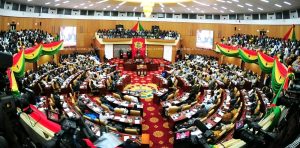|
Getting your Trinity Audio player ready...
|

In a move aimed at both celebrating Ghanaian culture and safeguarding its linguistic heritage, Parliament is poised to introduce the use of local languages on the floor of the House. The decision, embedded within Order 63 of the new Standing Orders, signifies a pivotal step towards nurturing and promoting the diverse linguistic tapestry that defines the nation.
Under this progressive provision, Members of Parliament (MPs) will have the liberty to articulate their deliberations and contributions in any of the local languages. However, to ensure inclusivity and comprehension among all stakeholders, simultaneous interpretation and translation services will be provided.
This landmark initiative is slated to commence during the forthcoming second meeting of the fourth session of the Eighth Parliament. By embracing the rich linguistic diversity that characterizes Ghana, the legislative body endeavors to foster a more inclusive and representative democratic process.
Beyond its symbolic significance, the incorporation of local languages into parliamentary discourse holds profound implications for Ghana’s cultural landscape. Language serves as a vessel for heritage, encapsulating centuries of tradition, customs, and collective memory. By elevating local languages to the forefront of legislative proceedings, Parliament reaffirms its commitment to preserving and promoting Ghana’s cultural identity.
Moreover, the decision to integrate local languages into parliamentary debates serves as a potent catalyst for social cohesion and national unity. In a country where linguistic diversity is both a source of strength and a potential fault line, the recognition and validation of all languages reinforce the notion of belonging and mutual respect among citizens.
In practical terms, the utilization of local languages in parliamentary discourse holds the promise of enhancing accessibility and engagement among constituents. By dismantling linguistic barriers, lawmakers can effectively communicate with constituents whose primary language may not be English, thus amplifying democratic participation and accountability.
Furthermore, the embrace of local languages by Parliament is a testament to Ghana’s commitment to upholding international conventions on linguistic and cultural rights. As a signatory to various treaties and agreements promoting linguistic diversity and cultural heritage, Ghana’s legislative embrace of local languages aligns with its obligations to protect and promote these fundamental rights.
However, the successful implementation of this initiative hinges upon robust infrastructure and capacity-building measures. Adequate resources must be allocated towards the recruitment and training of interpreters proficient in a wide array of local languages. Additionally, efforts to standardize terminology and glossaries across different linguistic groups will be essential to ensuring accuracy and coherence in parliamentary proceedings.
In conclusion, Parliament’s decision to integrate local languages into its deliberative processes heralds a new chapter in Ghana’s democratic journey. By embracing linguistic diversity as a cornerstone of governance, the nation reaffirms its commitment to inclusivity, cultural preservation, and democratic participation. As Ghana navigates the complexities of modernity, its embrace of local languages stands as a powerful affirmation of identity, unity, and resilience in an ever-evolving world.